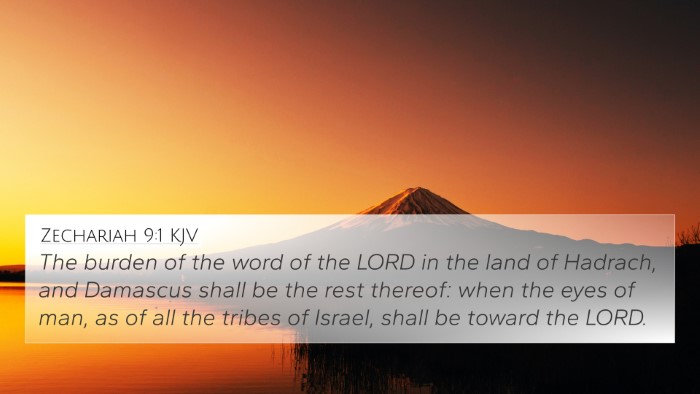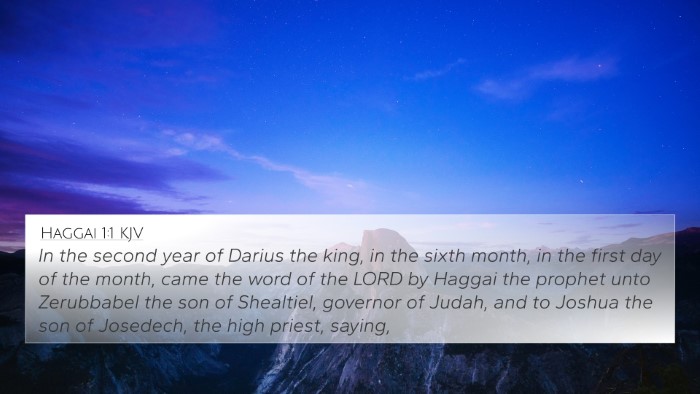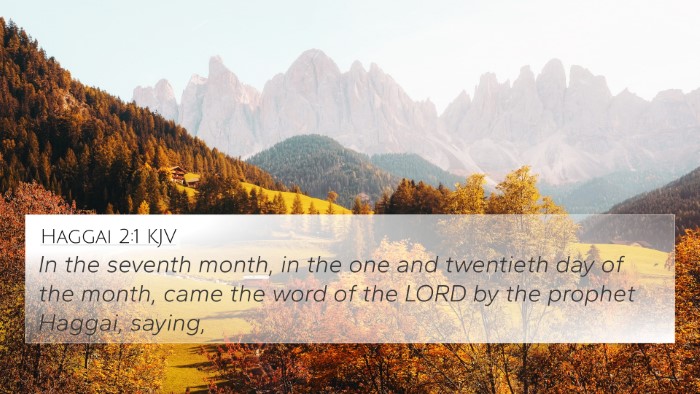Old Testament
Genesis Exodus Leviticus Numbers Deuteronomy Joshua Judges Ruth 1 Samuel 2 Samuel 1 Kings 2 Kings 1 Chronicles 2 Chronicles Ezra Nehemiah Esther Job Psalms Proverbs Ecclesiastes Song of Solomon Isaiah Jeremiah Lamentations Ezekiel Daniel Hosea Joel Amos Obadiah Jonah Micah Nahum Habakkuk Zephaniah Haggai Zechariah MalachiMalachi 1:1 Similar Verses
Malachi 1:1 Cross References
The burden of the word of the LORD to Israel by Malachi.
Uncover the Rich Themes and Topics of This Bible Verse
Listed below are the Bible themes associated with Malachi 1:1. We invite you to explore each theme to gain deeper insights into the Scriptures.
Malachi 1:1 Cross Reference Verses
This section features a detailed cross-reference designed to enrich your understanding of the Scriptures. Below, you will find carefully selected verses that echo the themes and teachings related to Malachi 1:1 KJV. Click on any image to explore detailed analyses of related Bible verses and uncover deeper theological insights.

Zechariah 9:1 (KJV) »
The burden of the word of the LORD in the land of Hadrach, and Damascus shall be the rest thereof: when the eyes of man, as of all the tribes of Israel, shall be toward the LORD.

Haggai 1:1 (KJV) »
In the second year of Darius the king, in the sixth month, in the first day of the month, came the word of the LORD by Haggai the prophet unto Zerubbabel the son of Shealtiel, governor of Judah, and to Joshua the son of Josedech, the high priest, saying,

Haggai 2:1 (KJV) »
In the seventh month, in the one and twentieth day of the month, came the word of the LORD by the prophet Haggai, saying,

Zechariah 12:1 (KJV) »
The burden of the word of the LORD for Israel, saith the LORD, which stretcheth forth the heavens, and layeth the foundation of the earth, and formeth the spirit of man within him.
Malachi 1:1 Verse Analysis and Similar Verses
Understanding Malachi 1:1
Verse: Malachi 1:1: "The burden of the word of the Lord to Israel by Malachi."
Summary and Meaning
The book of Malachi opens with a declaration about the prophetic message delivered to Israel. This first verse serves to establish both the authority of the prophet and the seriousness of the message. Throughout the various commentaries, several key insights arise:
-
Matthew Henry's Commentary:
Henry emphasizes the significance of the term "burden," which indicates not only the weight of the message but also the responsibility placed upon Malachi as a prophet. He notes that divine revelations are often heavy with expectation and warning for the people of God. This context is crucial as it shapes the reader's understanding of Malachi's subsequent messages as exhortations steeped in urgency.
-
Albert Barnes' Notes:
Barnes explains that the phrase "the word of the Lord" signifies a direct communication from God, underscoring the seriousness and authority behind the messages Malachi conveys. The reference to Israel highlights that this message is specifically aimed at God's chosen people, signifying a promise of covenant relationship despite their moral decline.
-
Adam Clarke's Commentary:
Clarke elaborates on the prophetic role of Malachi, noting that he is the last of the Old Testament prophets before the silence that precedes the New Testament. This verse functions not only as an introduction but also sets the stage for addressing Israel's spiritual apathy and the need for genuine worship.
Connections Between Bible Verses
Malachi 1:1 interrelates with several other scripture passages, highlighting thematic and prophetic links throughout the Bible:
- Zechariah 1:1: Reflects the burden of a prophetic message concerning the people of Israel.
- Isaiah 13:1: Illustrates the weight of prophetic burdens directed toward nations and peoples.
- Jeremiah 1:1-2: Details God's calling of Jeremiah, emphasizing the role of individuals chosen to deliver His words.
- Micah 1:1: Provides similar introductory phrasing regarding God's messages through the prophet.
- Ezekiel 1:3: Also begins with the mention of "the word of the Lord," discussing the prophetic nature of Ezekiel's ministry.
- Revelation 1:1: Discusses the revelation given to John, thereby connecting the role of prophecy across new and old covenants.
- 1 Peter 1:10-12: Speaks regarding the prophets who prophesied and inquired carefully, hinting at the depth of God’s words.
Thematic Bible Verse Connections
Key themes present in Malachi 1:1 can also reflect wider biblical doctrines and teachings:
- Prophetic Authority: The authoritative nature of God's communication through prophets is echoed throughout biblical literature.
- Covenant Relationship: The importance of the covenant between God and Israel is foundational in both the Old and New Testaments, often highlighted in prophetic declarations.
- Call to Repentance: Malachi's messages would call Israel to authentic worship and repentance, paralleling themes found in other prophetic writings.
Inter-Biblical Dialogue
This prophetic declaration prompts readers to engage in a broader dialogue within the Scriptures:
- Old Testament and New Testament Intersections: Malachi serves as a crucial link between the Testaments, setting up expectations fulfilled in Christ.
- Comparative Analysis of Prophets: By studying Malachi alongside other prophets, one can glean insights into God's unchanging nature and His expectations of His people.
Tools for Bible Cross-Referencing
To better understand Malachi 1:1 in context, several tools and methodologies can aid in cross-referencing:
- Bible Concordance: Useful for tracing words and themes throughout Scripture, helping to identify parallels.
- Bible Cross-Reference Guide: A resource outlining connections and relationships between verses.
- Cross-Reference Bible Study: Methods that facilitate deeper examination of scriptural relationships and themes.
Conclusion
Malachi 1:1 is not simply an introductory statement but establishes a crucial framework for understanding the theological implications of the entire book. The prophetic voice continues to resonate through cross-references, illustrating God’s commitment to His covenant people and the serious nature of the messages delivered through His prophets.





